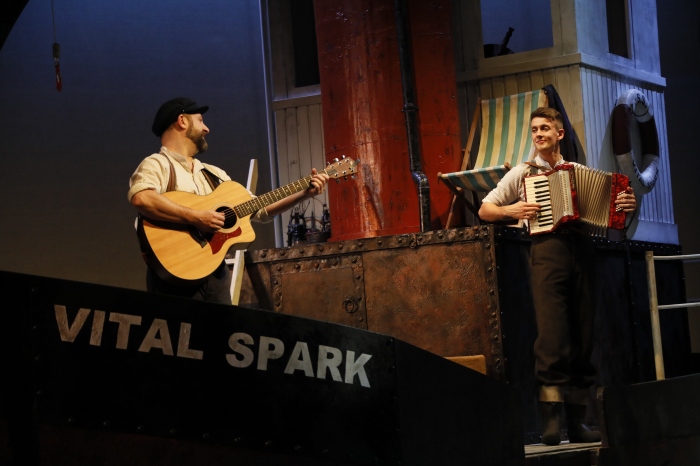THEATRE REVIEWS
Jumpy
Royal Lyceum, Edinburgh
Until November 12
Para Handy
Pitlochry Festival Theatre
Until November 13
Reviewed by Mark Brown

April De Angelis’s Jumpy, the first comedy in the inaugural programme of new Lyceum director David Greig, received many plaudits when it premiered at the Royal Court in London five years ago. A play in which 50-year-old Hilary struggles to handle her wayward teenage daughter, Tilly, its initial acclaim might say more about London theatre culture than about the drama itself.
Much has been written about the character of Hilary, who protested against the nuclear weapons at Greenham Common in the eighties and wonders, ruefully, what has happened to the feminism of her youth. The problem with this focus is that it can give the impression than De Angelis is a cross between Caryl Churchill and Diane Abbott, whereas her play is reminiscent of nothing so much as the farces of Alan Ayckbourn.
Relocated, in Cora Bissett’s production, from East London to Glasgow, the piece is drearily conventional and freighted with two-dimensional characterisations. The adults exist in various, and entirely predictable, conditions of mid-life crisis, while the teenagers are walking stereotypes; at one point Tilly almost transforms into an unfunny, female version of Harry Enfield’s monstrous adolescent Kevin, screaming at Hilary, “I can’t believe you did that. You’ve ruined my life!”
If the script creaks under the weight of its own obviousness, it is done no favours by Jean Chan’s astoundingly dreadful set design. An impossibly cluttered, towering mess of furniture and domestic appliances, its symbolic work is done 30 seconds into the production. For the remainder of the show it is merely a titanic annoyance.
Which is a pity, as Bissett has assembled a fine cast, led splendidly by the excellent Pauline Knowles (Hilary) and Molly Vevers (Tilly). If only they were being given more interesting things to do.

By contrast, Pitlochry Festival Theatre’s revival of John Bett’s Para Handy (based upon the famous seafaring stories by Neil Munro) is a lively and memorable stage comedy. This is ironic, as Bett’s play-with-songs might be expected to be weighed down with nostalgia, looking back, as it does, to well-loved tales that are set more than 100 years ago.
However, all such fears are allayed from the moment the crew of Para Handy’s ship, the Vital Spark, breaks into live music and song. Robert Pettigrew’s compositions are sewn deftly through a script that succeeds in creating a neat balance between comedy and pathos.
The showmanship of American seaman Hurricane Jack (Chris Forbes on delightfully narcissistic form) is a treat. Likewise the efforts of Para Handy (played with wonderful self-regard by Keith Fleming) to woo the baker’s widow Mary Crawford of Campbeltown (the upright Clare Waugh).
Indeed, Bett has the measure of this thrusting machismo, channelling it into the kind of seaside postcard double entendres any early-20th century Glaswegian would expect on a trip “doon the watter” to Millport. Needless to say that, in the play’s Carry On Up The Hebrides vein, Mary’s “buns are legendary”.
There’s some poignancy in the midst of the japery, however. As the First World War approaches, and the cast plays a humorous version of a German oompa band number, young Sunny Jim (the fine Scott Gilmour) arrives on board in his army uniform. Innocent and optimistic, but surrounded by the trepidations of his friends, he already looks like a ghost of the fallen.
Director Liz Carruthers’s production is beautifully timed, perfectly pitched and excellently cast (with Stephen Clyde, Harry Ward and Kirsty McDuff also shining). As so often at Pitlochry, the set which is dominated by designer Becky Minto’s splendid, life-size rendering of the Vital Spark, is a star of the show.
These reviews were originally published in the Sunday Herald on November 6, 2016
© Mark Brown